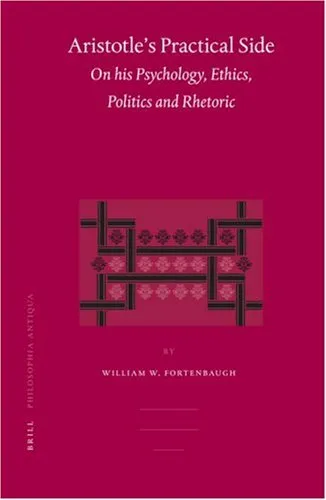Aristotle's Practical Side: On His Psychology, Ethics, Politics And Rhetoric
4.5
Reviews from our users

You Can Ask your questions from this book's AI after Login
Each download or ask from book AI costs 2 points. To earn more free points, please visit the Points Guide Page and complete some valuable actions.Introduction to Aristotle's Practical Side: On His Psychology, Ethics, Politics, and Rhetoric
Aristotle, one of the most influential ancient philosophers, is often remembered for his systematic work in metaphysics, logic, and natural sciences. However, his immense contributions to practical philosophy — encompassing psychology, ethics, politics, and rhetoric — remain equally significant. Aristotle's Practical Side: On His Psychology, Ethics, Politics, and Rhetoric draws readers into this realm, offering a comprehensive exploration of these deeply interconnected domains. Guided by Aristotle's own writings and complemented by modern scholarship, this book is both a foundational introduction and a profound analysis of his practical philosophy.
This book shines a spotlight on Aristotle's conviction that philosophy must not only seek abstract truths but also provide practical guidance for living a good life, managing societies, and convincing others through persuasive speech. It systematically dissects Aristotle's insights into human action and decision-making, his understanding of virtue, his theories about political governance, and the role of rhetoric in shaping public discourse. At its core, this book emphasizes Aristotle's belief in the harmony between intellectual rigor and practical application.
Structured with clarity and depth, the book bridges Aristotle's classical texts with contemporary discussions about human psychology, ethical behavior, and governance, ensuring relevance for modern readers.
Detailed Summary of the Book
This book presents a thematic study of Aristotle's practical philosophy, dividing its content into four key areas:
- In the realm of psychology, it delves into Aristotle's understanding of the soul, focusing on its capacities for perception, reasoning, and desire, all of which are integral to human action. Aristotle’s psychological framework underscores the inseparable link between mental processes and ethical conduct.
- The book sheds light on Aristotle's ethical theories, exploring his views on virtues as qualities that enable individuals to make reasoned, moral choices. Central to this is his doctrine of the "Golden Mean," which advocates for balance in ethical decision-making and emotional responses.
- Aristotle’s political insights are thoroughly explored, particularly his vision of the polis (city-state) as the ideal context for human flourishing. The discussion emphasizes his classification of political systems, advocacy for a mixed constitution, and his belief in the role of education and civic responsibility within a well-functioning community.
- Lastly, Aristotle’s rhetoric is elucidated as the art of persuasion grounded in ethos (character), pathos (emotion), and logos (logical argumentation). By connecting rhetoric with ethics, the book shows how persuasive communication aligns with the broader goals of practical philosophy.
Throughout the book, Aristotle’s ideas are made accessible without oversimplification, enriching both seasoned scholars and readers new to his works.
Key Takeaways
- Ethics, politics, and rhetoric are not isolated disciplines; they are deeply interconnected in Aristotle's philosophy, reflecting the holistic nature of human experience.
- Human happiness (eudaimonia) is achieved through virtuous action guided by reason, necessitating the cultivation of both personal and communal virtues.
- Effective rhetoric is not merely about persuasion; it is about ethical persuasion that aligns with truth and justice.
- Political structures must prioritize the common good, balancing personal freedom with collective responsibility.
- Aristotle’s psychological insights remain relevant today, offering perspectives on human motivation, responsibility, and moral development.
Famous Quotes from the Book
The book not only clarifies Aristotle's ideas but also highlights key passages that continue to resonate with modern audiences:
"It is the mark of an educated mind to be able to entertain a thought without accepting it."
"Man is by nature a political animal."
"The aim of art is to represent not the outward appearance of things, but their inward significance."
"Virtue is a mean between two vices, one of excess and the other of deficiency."
Why This Book Matters
Aristotle’s philosophy may have been conceived in ancient Greece, but its relevance endures across centuries. This book matters because it provides a bridge between Aristotle’s timeless insights and the practical challenges of modern life. By emphasizing the harmonious integration of psychology, ethics, politics, and rhetoric, it equips readers with tools to think critically about their own lives and the societies they inhabit.
In an age of political polarization, ethical dilemmas, and the pervasive influence of media, Aristotle’s belief in reasoned discourse, virtuous action, and the pursuit of the common good serves as a compass. For students, scholars, and readers interested in philosophy, this book is a guide to understanding not only Aristotle but the foundational principles of a life well-lived and a society well-governed.
Free Direct Download
You Can Download this book after Login
Accessing books through legal platforms and public libraries not only supports the rights of authors and publishers but also contributes to the sustainability of reading culture. Before downloading, please take a moment to consider these options.
Find this book on other platforms:
WorldCat helps you find books in libraries worldwide.
See ratings, reviews, and discussions on Goodreads.
Find and buy rare or used books on AbeBooks.
1274
بازدید4.5
امتیاز50
نظر98%
رضایتReviews:
4.5
Based on 0 users review
"کیفیت چاپ عالی بود، خیلی راضیام"


